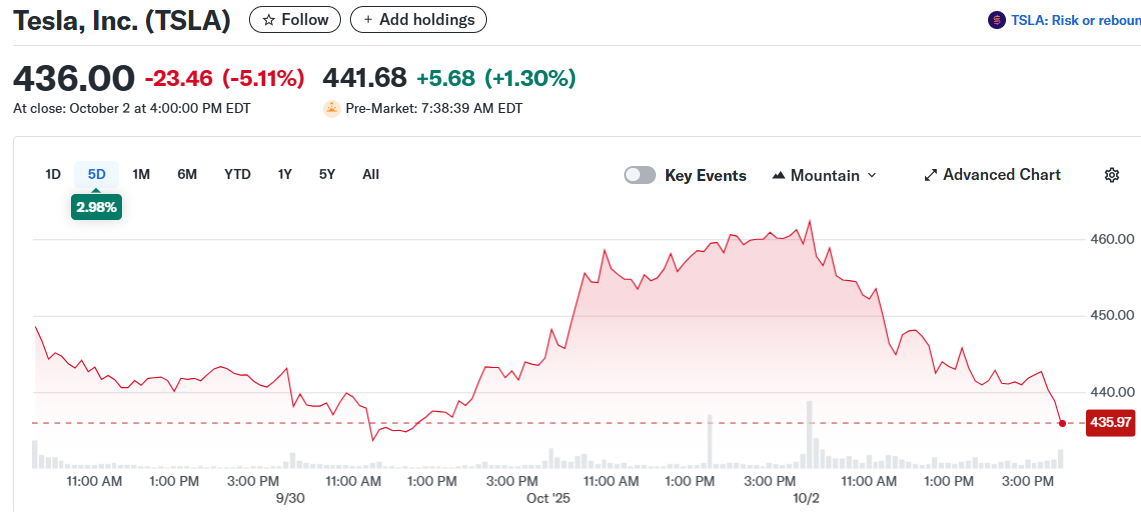TLDR
- Tesla shares dropped 5.1% Thursday after reporting strong Q3 deliveries that beat Wall Street expectations
- Buyers rushed to purchase EVs before the $7,500 federal tax credit expired, boosting sales across the industry
- Analysts expect Musk’s controversial pay package worth up to $1 trillion to pass despite NYC Comptroller opposition
- The stock recovered 1.6% Friday and remains up 75% over the past 12 months
- Tesla now faces questions about sustaining sales growth without government subsidies as it pivots toward AI
Tesla reported third quarter deliveries that exceeded Wall Street forecasts. Yet shares tumbled 5.1% on Thursday.

The stock bounced back Friday, climbing 1.6% to $442.96. Despite the recent drop, shares are up 75% over the past year.
The delivery surge resulted from customers rushing to buy before the $7,500 federal EV tax credit disappeared. Congress eliminated the incentive under Republican leadership.
Other EV makers saw the same pattern. GM, Ford, and Rivian all posted strong Q3 sales numbers.
Tesla stock had already jumped 40% in the month before the delivery announcement. Investors priced in the good news early.
What Happens Without Tax Credits?
The real concern is what comes next. Tesla now operates without the safety net of federal subsidies.
Canaccord analyst George Gianarikas praised the Q3 results. But he asked the critical question: “How will [fourth quarter] and 2026 shape up after the U.S. EV tax credits have gone away?”
He expects Q4 sales to decline before rebounding in 2026. The first half of 2025 was already tough for Tesla.
Public criticism of CEO Elon Musk hurt the brand. Now the company must prove it can thrive without government help.
Market technician Katie Stockton advises holding shares for now. She thinks new all-time highs are possible.
But she warns investors to watch the 50-day moving average at $361. Falling below that level would be a red flag.
The Compensation Controversy
New York City’s Comptroller released a letter Thursday attacking Tesla’s corporate governance. The letter called on shareholders to reject Musk’s pay package.
The compensation plan could be worth $1 trillion if performance goals are met. That would be unprecedented for any CEO.
Analysts don’t think it will fail though. Wedbush analyst Dan Ives said there’s a “better chance of me playing in the NFL this season” than shareholders voting it down.
The reason lies in Tesla’s ownership structure. Retail investors own roughly 40% of tradable shares.
That’s twice the percentage seen at other major tech companies. These individual investors have backed Musk’s pay packages before.
They’ve supported him even when proxy advisory firms recommended voting no. The current package stems from Musk’s desire to control 25% of Tesla.
He wants enough voting power that he can’t be forced out by institutional investors.
The Robotaxi Revolution
Tesla is transforming from a car company into an AI and robotics business. The Cybercab autonomous vehicle starts production next year.
This dedicated robotaxi sits at the center of Tesla’s self-driving strategy. Supporters believe it will change everything.
“The AI valuation will start to get unlocked in the Tesla story,” Ives wrote in a research note. He thinks the AI-driven valuation story has begun.
Ives expects the Trump administration to speed up approvals for Tesla’s autonomous programs. He argues that competing with China in AI benefits both the government and Tesla investors.
Tesla trades at 175 times projected 2026 earnings. That’s expensive compared to traditional automakers.
But bulls insist Tesla isn’t a regular car company. They say comparing it to Ford or GM misses the point entirely.






